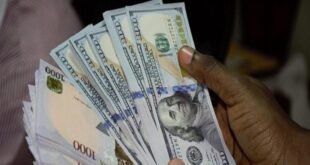Vice President, Oil and Gas at Dangote Industries Limited (DIL), Devakumar Edwin, lamented the large number of permits given indiscriminately to marketers who he said end up importing dirty fuel into Nigeria, endangering the health of citizens and polluting the environment.
He deplored the actions of the Nigerian Midstream and Downstream Petroleum Regulatory Authority (NMDPRA) which caused much loss to the country.
Edwin was speaking at a one-day training program, organized by Dangote Group Energy Editors at the weekend.
He stated that the country is also playing into the hands of International Oil Companies (IOCs) “by continuing to issue import permits, thereby harming our economy and harming the health of Nigerians who are exposed to carcinogenic products.
“Despite the fact that we produce and market diesel, complying with ECOWAS regulations and standards, permits are issued, in large quantities, to traders who buy diesel with very high sulfur content from Russia and dispose of it in other countries. Nigerian market. Since the US, EU and UK imposed a Price Cap Scheme from 5 February 2023 on Russian Petroleum Products, a large number of ships are waiting near Togo with Russian ultra-high sulfur diesel fuel and, these ships are being purchased and dumped into the Nigerian Market .
“In fact, some European countries are so concerned about the carcinogenic effects of diesel fuel with extra high sulfur content being dumped into the Nigerian market that countries like Belgium and the Netherlands have imposed bans on exports of the fuel from their countries to West Africa. , recently. It is very sad that this country is giving import permits for such dirty diesel to be imported into Nigeria, even though we have more than enough petroleum refining capacity locally.”
He said, “The Federal Government issued 25 permits to build the refinery and we were the only one to fulfill the promise. In fact, we deserve full support from the Government. It is worth noting that since the start of production, more than 3.5 billion liters, representing 90 percent of our production, have been exported. We call on the Federal Government and regulators to provide us with the necessary support to create jobs and prosperity for the country.”
READ ALSO: Why we prohibit fuel supplies to border areas – Head of Customs
It is worth recalling that in May, Belgium and the Netherlands adopted new quality standards to stop exporting cheap and low-quality fuel to West Africa, thereby aligning their standards with those of the European Union. These measures align fuel export standards with European domestic markets, specifically targeting diesel and petrol with high sulfur and chemical content.
Historically, this fuel, with sulfur contents reaching 10,000 ppm, was exported at lower prices to countries such as Nigeria and other West African consumers.
Belgium’s Minister of the Environment, Zakia Khattabi, announced that his country would follow the Netherlands, which in April 2023 also banned the export of low-quality petrol and diesel to West Africa via the ports of Amsterdam and Rotterdam.
Khattabi stressed that the Dutch decision to limit exports of dirty fuel has diverted trade to Belgium, which is now used by oil producers and traders to export gasoline with too high levels of benzene and sulfur.
“For too long toxic fuel has moved from Belgium to other countries including Africa. This causes very poor air quality in countries such as Ghana, Nigeria and Cameroon and is even carcinogenic,” said Khattabi.
In September 2017, an investigation carried out by the international organization Public Eye revealed that contaminated and toxic fuel was being exported on a large scale from the ports of Rotterdam and Amsterdam for export to African markets. As much as a quarter of the petrol and diesel available in West Africa comes from the ports of Amsterdam, Rotterdam and Antwerp. These fuels contain sulfur and other pollutants, such as cancer-causing benzene, in amounts up to 400 times the permitted limit in Europe. The Netherlands and Belgium were ordered to enforce regulations to protect millions of Africans from exposure to toxic fuels.
“The decision of the Nigerian Midstream and Downstream Petroleum Regulatory Authority (NMDPRA) to grant indiscriminate permits to the import of dirty diesel and aviation fuel has prompted the Dangote refinery to expand into foreign markets. The refinery recently exported diesel and aviation fuel to Europe and other parts of the world. The same industry players are also opposing us because of the falling prices of diesel and aviation fuel, but our goal, as I said before, is to grow our economy, continued Edwin.
He noted that because the refinery meets international standards and adheres to strict guidelines and regulations to protect the local environment, it can export its products to Europe and other parts of the world.
While calling on the Federal Government and the National Assembly to urgently intervene to expedite the implementation of the PIA and ensure that the interests of Nigeria and the Nigerian people are protected, he said: “Recently, the government of Ghana, through a law has banned the import of high quality products. contaminated diesel and PMS into their territory. It is unfortunate that in Nigeria, import permits are granted even though we know that we have the capacity to produce almost double the quantity of products required in Nigeria and even export the surplus. Since January 2021, ECOWAS regulations have banned the import of highly contaminated diesel into the region.”
The post Dangote regrets that Nigerian government gave permission to import dirty fuel banned in Europe appeared first on Latest Nigerian News | Top News from Ripples Nigeria.
 JamzNG Latest News, Gist, Entertainment in Nigeria
JamzNG Latest News, Gist, Entertainment in Nigeria









